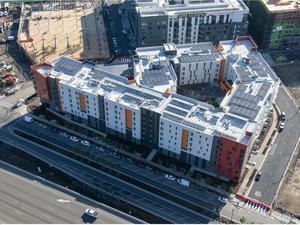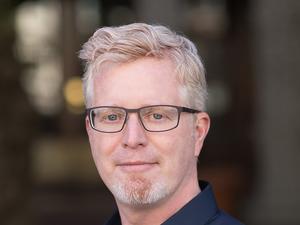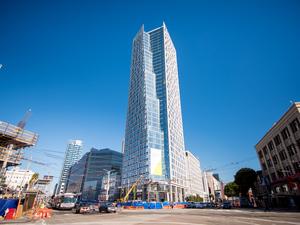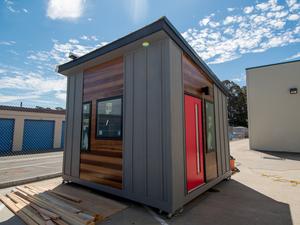Longtime housing organizations and startups alike are tackling the affordability crisis in the Bay Area, bringing the region’s penchant for innovation to the issue. Here’s a look at three.
Landed
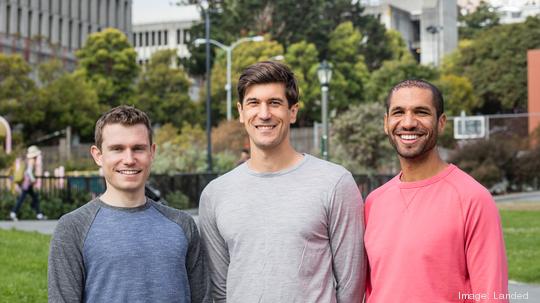
Landed co-founders Jesse Vaughn, Jonathan Asmis and Alex Lofton.
Landed
- About the company: San Francisco-based Landed, founded in 2015, provides down payment assistance through a shared equity model for home buyers who are essential professionals such as teachers, health care workers and government employees.
- How it works: The company will provide up to 15% of the purchase price of a home, or up to $120,000 total, and Landed takes a 1.25% fee that can be waived for the homeowner if Landed partner agents are used. Landed is not a lender and no interest is collected during the 30-year term of a buyer’s agreement. If a homeowner ends the partnership any time during that 30-year term, they pay Landed an amount equal to Landed's initial contribution plus or minus a portion of the home's change in value.
- Background: Landed was founded by Alex Lofton, Jesse Vaughn and CEO Jonathan Asmis — a mix of homeowners and renters, themselves — to help essential workers afford homes. The team took inspiration from other housing programs like USAA’s services for military veterans, San Francisco’s down payment assistance program and one managed by Stanford University for faculty and staff.
- Problem solved: The shared equity model and down payment assistance helps buyers to compete in markets where they’d normally be priced out. Landed says that 58% of its customers are lower to middle income.
- Why it matters: Home ownership creates stability and generates wealth that can be passed down to children and grandchildren, but people of color are disproportionately locked out of ownership. Historical red lining, in which banks refused to approve loans in lower income and predominantly Black neighborhoods, has created a generational wealth gap between white and Black families. And rising housing costs have priced ownership is out of reach for lower- and middle-income families. In San Francisco, the median cost of a home is $1.5 million, more than double the cost a decade ago, according to Zillow. The median income for a single adult in San Francisco is more than $93,000 in 2021 — high nationally, but far short of what’s needed for that median-priced house.
- Funding: $53.1 million raised through Series B with additional grants provided by other organizations to cover the actual costs of the down payments,including The Chan Zuckerberg Initiative, Zoma Capital and TIAA
- The outlook: Landed says that its Black and Latino customers in the Bay Area buy homes at rates that are double to quadruple those in the general population: In the Bay Area, 7% of its clients are Black and 34% are Latino compared to just 3% and 9% in the general population.
- Examples: Since 2015, Landed says it has helped over 800 people buy $500 million worth of homes across the country. In the Bay Area, those success stories include Maritza Sanchez, a San Francisco native and registered nurse at UCSF Benioff Children’s Hospital. Even with Landed’s financial help, it took 16 bids to find a seller who would accept her offer.
–Sara Bloomberg
Rent the Backyard
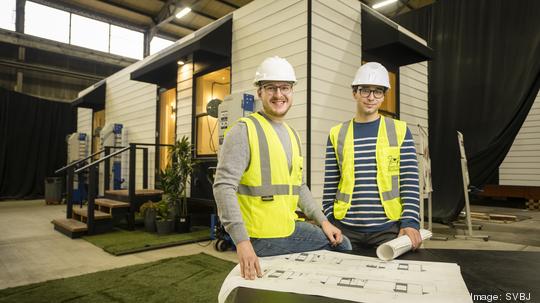
Brian Bakerman and Spencer Burleigh founded Rent the Backyard, which designs, permits and builds accessory dwelling units
Tomas Ovalle / Silicon Valley Business Journal
- About the company: Santa Cruz-based Rent the Backyard, founded in 2018, builds and delivers accessory dwelling units, also acquiring the permits needed for construction.
- Background: Accessory dwelling units, or ADUs, are typically small, one- to two-bedroom homes built in peoples’ backyards. Housing bills passed the state legislature in recent years have made it easier than ever to build ADUs.
- Problem solved: Despite the relative ease in building ADUs, homeowners still have a hard time affording the cost of construction and face difficulty in acquiring the necessary building permits. Rent the Backyard simplifies the process. The company builds one-bedroom ADUs in its factory in Oakland, then delivers them to homeowners. The design has already been pre-approved by the California Department of Housing and Community Development. In addition, Rent the Backyard acquires the permits needed for construction, taking the burden of navigating complex city building departments off of homeowners. The company also offers financing for the units, which cost $199,000 each. Homeowners can apply for a 30-year mortgage at $800 a month to install the ADU.
- Why it matters: The Bay Area has a deficit of more than 200,000 affordable housing units, according to a report from the National Low Income Housing Coalition. Hundreds of thousands of single-family homes in the Bay Area have room in their backyards for a small ADU. “It adds this really nice distributed housing across the Bay,” said Spencer Burleigh, co-founder of Rent the Backyard. “While you may not see a price impact with one, 10 or 100 ADUs, when we start to see more units come online, we’re going to start to see a downward pressure on price.” That downward pressure means that people who would not otherwise have the ability to afford a home in an area may finally be able to join the neighborhood: “More people are able to access a community they wouldn’t otherwise be able to,” Burleigh said. “I think it’s going to be able to bring a lot of income and racial diversity to these places.”
- Funding: $175,000 in seed funding from Y Combinator, Zillionize, K2 Global, Cleo Capital and Twenty Two Ventures, according to PitchBook Data
- The outlook: Burleigh is not optimistic when it comes to the Bay Area’s steep housing shortage. “If anything will kill Silicon Valley, it’ll be that. ...People chasing a dream can’t actually come here to live, and they endup choosing somewhere else,” Burleigh said. “I just want more people to be able to come here and experience it and actually afford it, and I’m scared that they won’t be able to do that.”
- Examples: Rent the Backyard builds and delivers about two homes per month. The company has shipped ADUs to cities across the Bay Area and is currently working on two homes for Berkeley and Redwood City.
–Sonya Herrera
Community Housing Development Corp.
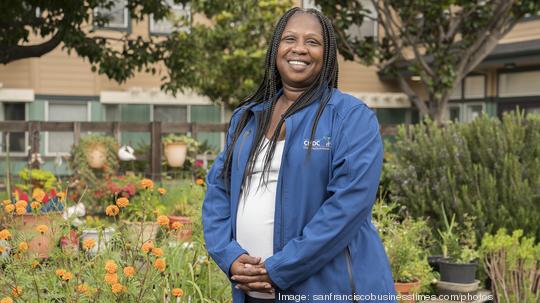
Joanna Griffith, assistant director of real estate development at the Community Housing Development Corp., poses in the garden of a senior housing complex that CHDC developed.
LiPo Ching | San Francisco Business Times
- About the organization: CHDC is a Richmond nonprofit housing developer that was founded in 1990 and has about 1,500 units in its development pipeline.
- The innovation: CHDC launched a faith-based initiative in 2018 to partner with religious organizations in Oakland and around the East Bay to develop affordable housing on church properties. The initiative helps stop exploitative development of surplus properties owned by community churches while ensuring those lots — and their high potential to be developed into affordable housing — do not go to waste.
- How it works: CHDC establishes partnerships with churches interested in developing surplus property to generate revenue. The nonprofit developer guides its faith-based partners through the entitlement process. Most deals feature a long-term ground lease, enabling churches to retain ownership of the property while receiving steady ground lease payments. CHDC largely uses federal and state tax credits to fund construction and then manages the housing units.
- Background: In recent years — and especially over the course of the pandemic – financially challenged churches have become the target of predatory lending schemes, said Joanna Griffith, CHDC’s assistant director of real estate development. “They would take out these loans with interest rates they’d never be able to pay back, because they were in dire straits to begin with,” Griffith said. “Ultimately, their properties were being foreclosed upon, or they were being approached by developers that were only willing to offer up, like, 5% or 10% of the profit.”
- Why it matters: CHDC’s partnerships will add to the limited pool of affordable housing available to low-income, very low-income and extremely low-income families and individuals, Griffith said, and often set aside units for formerly unhoused persons. Where possible, CHDC works with churches to prioritize vulnerable members of their own congregations for housing.
- Funding: About three-quarters of CHDC’s funding comes from state tax credits and bonds; additional funding comes from the federal and local levels.
- The outlook: CHDC currently has around 500 faith-based units across eight different projects in its development pipeline and expects that number to grow. Faith-based organizations familiar with CHDC’s initiative have begun reaching out directly to the organization in hopes of establishing partnerships. While none of its faith-based partnerships has yet yielded a project that has broken ground, SB 35 — which grants an expedited approval process to 100% affordable projects in jurisdictions out of compliance with their RHNA assignments — has proved a significant tailwind, Griffith said. Several of CHDC’s projects — including the Friendship Christian Center in West Oakland and a pair of projects in South Berkeley’s Adeline Corridor — could break ground in 2022, so long as CHDC is able to secure adequate funding for each, Griffith said. If all goes well, the trio of projects could be on track for completion in 2024.
- Examples: 54 units on a one-acre lot owned by Ephesians Church at 1708 Harmon St. and 62 units on around a tenth of an acre owned by St. Paul African Methodist Episcopal Church at 2024 Ashby Ave., about a half-mile away from each other in South Berkeley. CHDC successfully assisted the two churches in their bids to secure city funding for the pre-development of the two projects earlier this year, according to Griffith. Both projects will be 100% affordable. If they secure necessary funding over the course of the next year, they could be completed by 2024.
–Sarah Klearman
